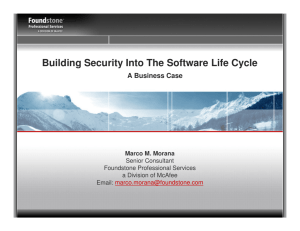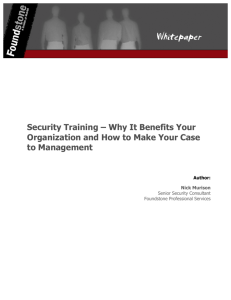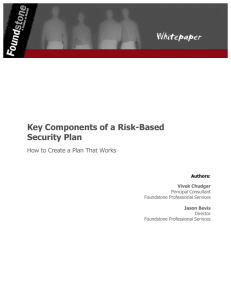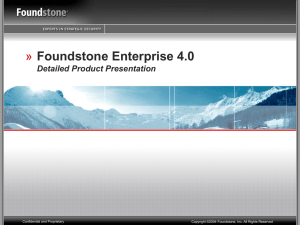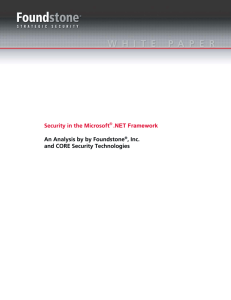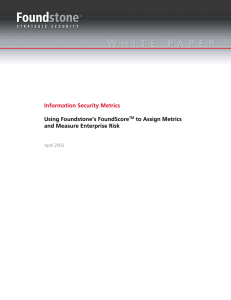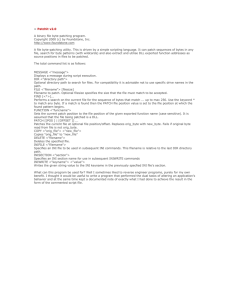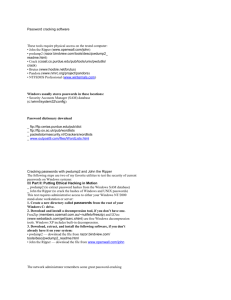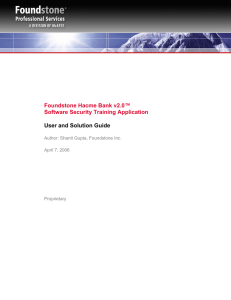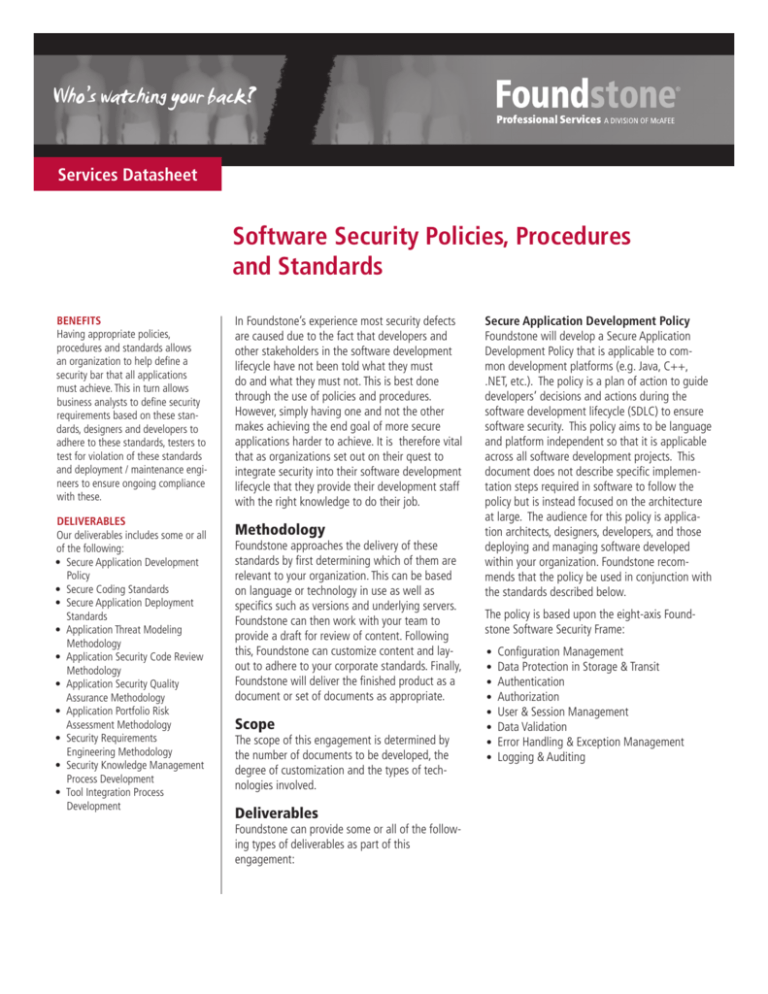
Services
Document
Datasheet
Type
Software Security Policies, Procedures
and Standards
Benefits
Having appropriate policies,
procedures and standards allows
an organization to help define a
security bar that all applications
must achieve. This in turn allows
business analysts to define security
requirements based on these standards, designers and developers to
adhere to these standards, testers to
test for violation of these standards
and deployment / maintenance engineers to ensure ongoing compliance
with these.
Deliverables
Our deliverables includes some or all
of the following:
• Secure Application Development
Policy
• Secure Coding Standards
• Secure Application Deployment
Standards
• Application Threat Modeling
Methodology
• Application Security Code Review
Methodology
• Application Security Quality
Assurance Methodology
• Application Portfolio Risk
Assessment Methodology
• Security Requirements
Engineering Methodology
• Security Knowledge Management
Process Development
• Tool Integration Process
Development
In Foundstone’s experience most security defects
are caused due to the fact that developers and
other stakeholders in the software development
lifecycle have not been told what they must
do and what they must not. This is best done
through the use of policies and procedures.
However, simply having one and not the other
makes achieving the end goal of more secure
applications harder to achieve. It is therefore vital
that as organizations set out on their quest to
integrate security into their software development
lifecycle that they provide their development staff
with the right knowledge to do their job.
Methodology
Foundstone approaches the delivery of these
standards by first determining which of them are
relevant to your organization. This can be based
on language or technology in use as well as
specifics such as versions and underlying servers.
Foundstone can then work with your team to
provide a draft for review of content. Following
this, Foundstone can customize content and layout to adhere to your corporate standards. Finally,
Foundstone will deliver the finished product as a
document or set of documents as appropriate.
Scope
The scope of this engagement is determined by
the number of documents to be developed, the
degree of customization and the types of technologies involved.
Deliverables
Foundstone can provide some or all of the following types of deliverables as part of this
engagement:
Secure Application Development Policy
Foundstone will develop a Secure Application
Development Policy that is applicable to common development platforms (e.g. Java, C++,
.NET, etc.). The policy is a plan of action to guide
developers’ decisions and actions during the
software development lifecycle (SDLC) to ensure
software security. This policy aims to be language
and platform independent so that it is applicable
across all software development projects. This
document does not describe specific implementation steps required in software to follow the
policy but is instead focused on the architecture
at large. The audience for this policy is application architects, designers, developers, and those
deploying and managing software developed
within your organization. Foundstone recommends that the policy be used in conjunction with
the standards described below.
The policy is based upon the eight-axis Foundstone Software Security Frame:
• Configuration Management
• Data Protection in Storage & Transit
• Authentication
• Authorization
• User & Session Management
• Data Validation
• Error Handling & Exception Management
• Logging & Auditing
Secure Coding Standards
Foundstone will develop a set of secure coding
standards that are specific to the platform(s)
outlined below:
als that are not security subject matter experts.
Classification of threats will be based upon the
eight-axis Foundstone Software Security Frame
described above.
• .NET / C#
• C++
• C
• ColdFusion
• PHP
• Perl
• Java (Java SE/Java EE)
The methodology will additionally provide advice
on documenting the threat model, however, the
specific mechanisms used by your organization to
document threat models are beyond the scope of
the methodology.
These coding standards are also based upon the
eight-axis Foundstone Software Security Frame.
The standard provides platform-specific guidance for implementing the Secure Application
Development Policy, described above. While these
standards can stand on their own, Foundstone
strongly recommends that these be deployed in
conjunction with the Secure Application Development Policy described above.
Secure Application Deployment Standards
Foundstone will develop a set of secure application deployment standards that are specific to the
platform(s) outlined below:
• .NET/C#
• ColdFusion
• PHP
• Perl
• Java (Java SE/Java EE)
These deployment standards are also based upon
the eight-axis Foundstone Software Security
Frame. The standard provides platform-specific
guidance for deploying applications in accordance
with the Secure Application Development Policy,
described above. While these standards can stand
on their own, Foundstone strongly recommends
that these be deployed in conjunction with the
Secure Application Development Policy described
above.
Application Threat Modeling Methodology
Foundstone will develop a Threat Modeling
Methodology for your organization based on the
threat modeling techniques used by our consultants. The methodology will be flexible for use
in a number of development environments and
throughout the development lifecycle by individu-
Application Security Code Review
Methodology
Foundstone will develop an Application Security
Code Review Methodology for your organization
based on the code review techniques used by
our consultants. The methodology will provide
specific steps to review application source code,
configuration and databases for commonly identified vulnerabilities using a variety of open source
and commercial tools but mostly focused on
manual reviews that augment your existing code
review processes. The methodology is designed
to be used with web-based, thick-client and thinclient applications.
Application Security Quality Assurance
Methodology
Foundstone will develop an Application Security
Quality Assurance Methodology for your organization based on the penetration testing techniques used by our consultants. The methodology
will provide specific steps to test software for
commonly identified vulnerabilities using a variety
of open source and commercial tools along with
the manual methods required to validate findings.
The methodology is designed to be used with
web-based, thick-client and thin-client applications.
Application Portfolio Risk Assessment
Methodology:
Foundstone will develop a process and framework for prioritizing applications for security
assessments and activities during a security
enhanced software development lifecycle. This
could include a self audit questionnaire that will
allow stakeholders to determine the key activities
that they must engage in at a very minimum to
provide the business with the security assurance levels needed. It is important to note that
these activities will be highly dependent on their
responses to the questionnaire and factors that
influence risk for the organization such as compliance goals, company policies and specific security
features.
Security Requirements Engineering
Methodology
One of the most ignored parts of a security
enhanced software development life cycle is the
security requirements engineering process. One
of the prime reasons for this oversight is that
security is assumed to be a technical issue and
therefore best handled during architecture and
design or better still during implementation.
Since software requirements are often written
by business analysts who are non-technical, this
is a common conclusion. Foundstone will work
with your organization to develop a process that
is light-weight and allows non-subject matter experts to effectively document and detail
security requirements for application development
projects.
Security Knowledge Management Process
Development
Often at Foundstone we see organizations fall
victim to issues that were fixed in other parts of
the organization - sometimes even within the
same team! While this is embarrassing, it is often
a symptom of the lack of effective knowledge
management. Valuable lessons can be learned
from the experiences and mistakes of others both
within the same organization and externally.
While training is certainly an important aspect in
improving overall security consciousness among
developers, it is also important that developers
have access to a central repository and portal for
providing them with guidance on a day to day
basis. This is especially important in large development organizations.
Foundstone can therefore help your organization
develop an effective process for security knowledge management. This will account for both
designing a channel that is effective in disseminating such information and also in maintaining
confidentiality when needed.
Tool Integration Process Development
Foundstone will work with your organization to
build a process around integrating technology
investments such as web application scanning
tools, web application firewalls and static source
code analysis tools into the existing development
processes. The process developed by Foundstone
in conjunction with key stakeholders at your
organization will focus on both the assessment
perspective for software developers, testers
and security analysts as well as the audit and
oversight perspective for management. Foundstone can also help during the product evaluation
process by aiding your organization in designing
bake-offs and developing an assessment criteria
as you compare the various vendor tool offerings.
The Foundstone Difference
All Foundstone projects are managed using
Foundstone’s proven Security Engagement Process (SEP) for project management. This process
ensures continual communication with your organization to ensure the success of all Foundstone
consulting engagements.
www.foundstone.com 1.877.91.FOUND Consulting@foundstone.com © 2008 Foundstone, A Division of McAfee. All Rights Reserved

